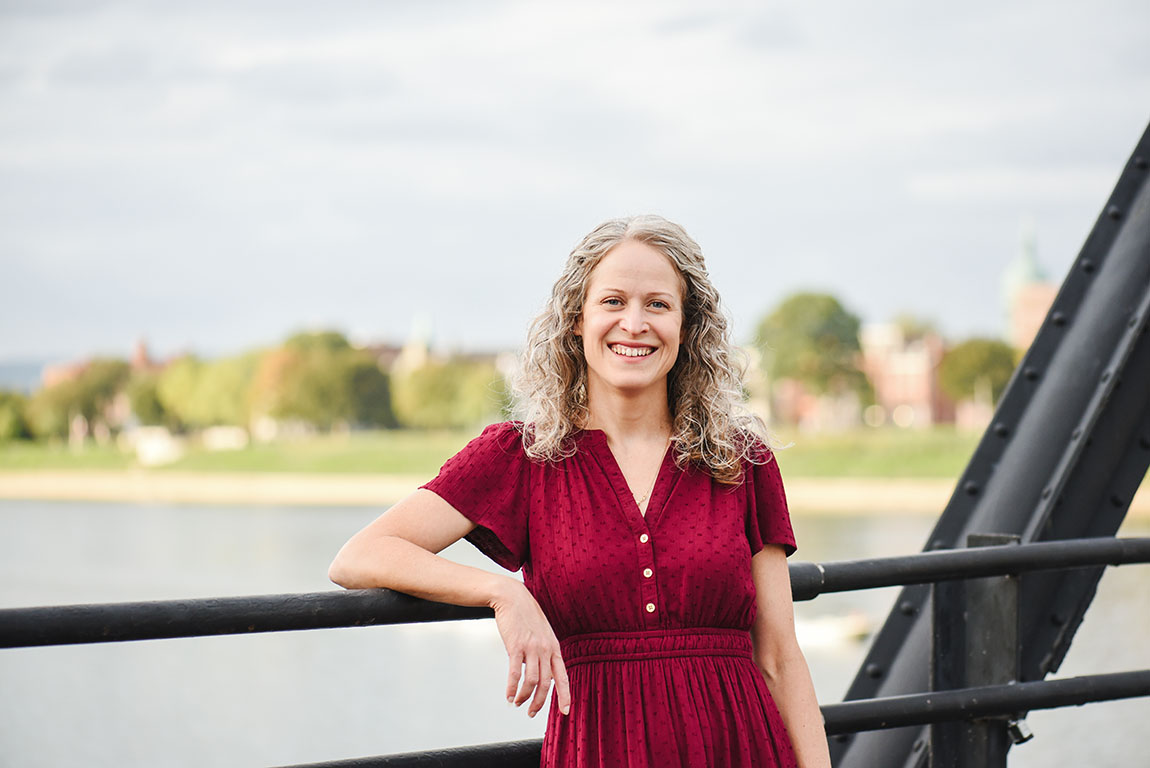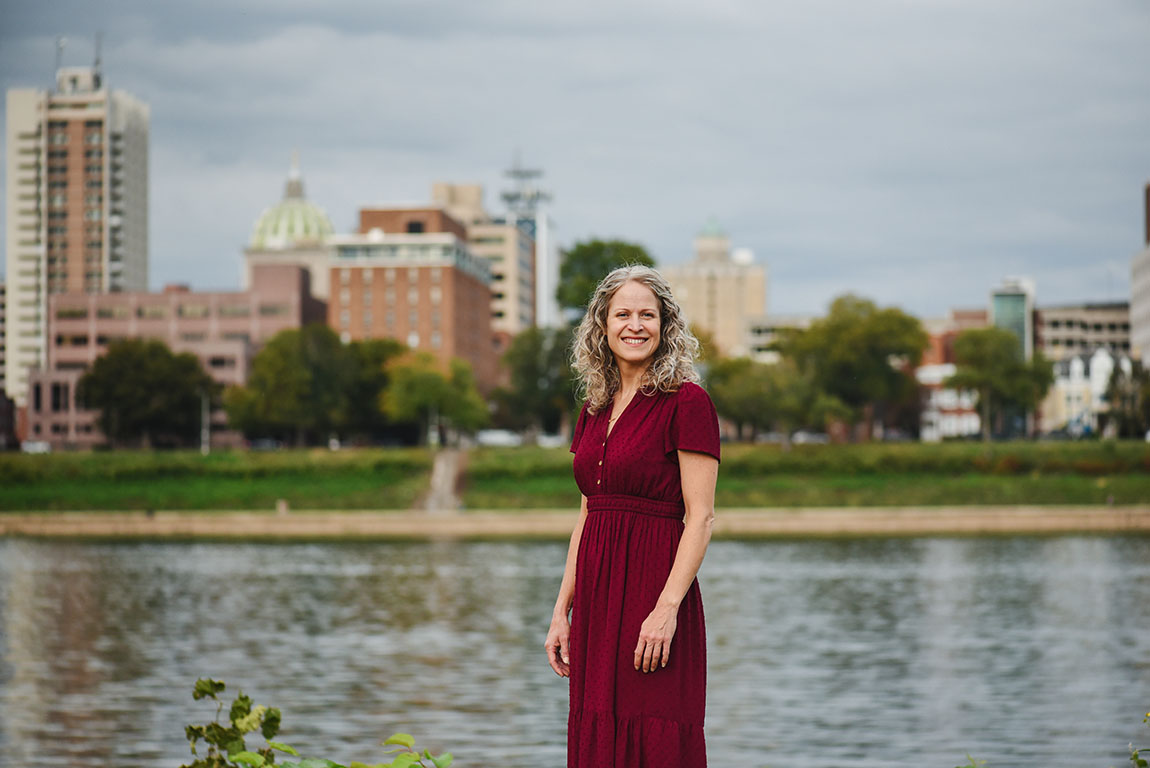Heidi Kunsch ’01 Helps Incentivize Sustainability
In her role with the Pennsylvania Department of Environmental Protection, Kunsch develops programs to encourage the adoption of clean transportation and green buildings in the Commonwealth.By: Meghan Kita Thursday, November 23, 2023 09:44 AM
 Heidi Kunsch ’01. Photos by Kristi Morris
Heidi Kunsch ’01. Photos by Kristi MorrisThis story originally appeared in the Fall 2023 issue of Muhlenberg Magazine. See the complete digital edition here.
Heidi Kunsch ’01, an environmental group manager in the Energy Programs Office at the Pennsylvania Department of Environmental Protection (PA DEP), describes two moments that primed her for her current line of work. The first came when she was still a Muhlenberg student, studying environmental science. She had an internship with the PA DEP in its air quality regulatory program. Her role involved traveling to air sampling stations throughout the state to monitor pollution. One of her sites was atop an elementary school situated between two oil refineries.
“It really ignited my passion for the environment, thinking that someday the samples I was collecting would be used … to protect those children who went to that school,” says Kunsch. “I was really fired up, and I loved what I did, so I knew I wanted to work for the PA DEP.”
“The glory of my work is that I actually get to come up with ideas for new energy programs, create them and carry them out or have my staff implement them.”
Her second pivotal moment came during graduate school at Penn State, where she studied environmental pollution control. She had a fellowship with the U.S. Environmental Protection Agency office in Philadelphia in its environmental innovations branch. That experience familiarized her with green buildings, those that are designed and constructed with a focus on efficiency and sustainability. These buildings use less energy and may even generate renewable energy via rooftop solar panels, resulting in a lower carbon footprint throughout the building’s lifespan.
“That particular branch [of the EPA] tried to prevent pollution before it was created,” she says. “There’s a definite need in the Commonwealth for folks to ensure that our environmental regulations are being followed, but for me, what I was passionate about was supporting those people who were innovating, the people in the architecture, engineering and construction communities who were designing and constructing buildings with the environment in mind.”

Kunsch refers to the “carrot and stick” analogy and says that ever since she discovered the more carrot-like environmental work — incentivizing good climate choices — it has been more appealing to her than the alternative (punishing bad ones). She’s held both kinds of roles at the PA DEP during her 16-year career there. The role she’s in now involves managing a three-person team that works on financial incentive programs and education and outreach programs to support clean transportation and green buildings.
A highlight of her year is the annual Greenbuild International Conference and Expo, which she first experienced as a graduate student and has attended about a dozen times since: “I don’t just go to a conference and not come back with ideas,” she says. “The glory of my work is that I actually get to come up with ideas for new energy programs, create them and carry them out or have my staff implement them.”
For example, at the 2021 conference, she attended a session with Christopher Galarza, a Pittsburgh-based chef who’s a national expert on kitchen electrification. She returned with the idea to create a program to incentivize commercial kitchens to transition to induction cooking equipment, which uses electromagnetic energy to heat food. There’s an education component, including workshops with Galarza in which interested parties can see the equipment and eat induction-prepared food. There’s also a rebate component that provides money back to K-12 schools, higher education institutions, restaurants and other commercial kitchens after they make the switch.
“Seeing that switch in people’s minds is incredibly rewarding. Being able to see folks get educated is something that really drives me.”
“The goal is to decarbonize our kitchens,” Kunsch says. “[My house] is all electric. I have a heat pump. I use no fossil fuels for cooking, heating or air conditioning. That’s what we’re trying to move the industry toward. Slowly but surely, our electric grid is going to become greener … When you combine that with all-electric buildings and all-electric transit, you’re heavily decarbonizing, and you’re making your deepest cuts in greenhouse gas emissions.”
Because that program is relatively new, the biggest outcome thus far is the number of people it has educated — 250 as of press time. In her previous role in the PA DEP’s Energy Programs Office, Kunsch developed the Local Climate Action Program, in which college students are educated alongside a local government to collaborate on developing a greenhouse gas inventory and climate action plan for that government’s jurisdiction. She earned a Governor’s Award of Excellence for developing and implementing this program, which reached approximately 440 municipalities in its first four years and is continuing into its fifth year.
Kunsch’s day-to-day involves a lot of meetings — with colleagues in the PA DEP and with external stakeholders including contractors, nonprofit organizations and federal government agencies. A challenge of the job is sifting through all the guidelines and requirements the federal government places upon the use of its funding. This can make it difficult and slow to be able to mobilize new programs. But once they’re up and running, Kunsch gets to see the benefits firsthand.
“You can’t incentivize change without educating. I’ve seen it multiple times throughout my job. Trying to convince folks to design green buildings or switch to induction, you have to educate first … For the induction cooking workshops we’re doing, I got to attend the first three, and seeing that switch in people’s minds is incredibly rewarding,” she says. “Being able to see folks get educated is something that really drives me.”
